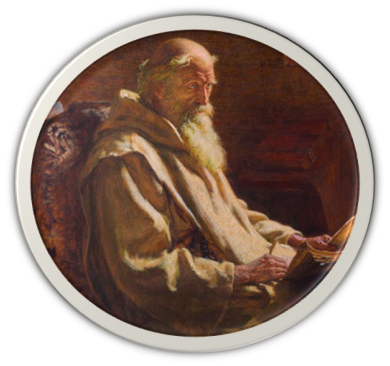Saint of the Week: Bede
5/28/2025

Bede the Venerable
8th Century AD
Priest, Monk, Scholar
Bede was a monk at the monastery of Wearmouth and Jarrow in Northumbria. From age seven, he spent his life at that monastery except for a few brief visits to nearby sites. He writes: "I have devoted my energies to a study of the Scriptures, observing monastic discipline, and singing the daily services in church; study, teaching, and writing have always been my delight.“ He was the first person to write scholarly works in the English language, although only fragments of his writings in English. He translated John’s Gospel into Old English, completing the work on the very day he died. He wrote extensively in Latin, too, most notably commentaries on the Pentateuch and other portions of Holy Scripture. His best-known work is his History of the English Church and People, a classic which has frequently been translated and is available in local libraries. It gives a history of Britain up to 729, speaking of the Celtic people who converted to Christianity during the first three centuries of the Christian era, the invasion of the Anglo-Saxon pagans in the 5th and 6th centuries and their subsequent conversions by Celtic missionaries from the north and west, as well as Roman missionaries from the south and east. His work is our chief source for the history of the British Isles during this period. Fortunately, Bede was careful to sort fact from hearsay, and to share sources of his information. He also wrote hymns and other verse, the first martyrology with historical notes, letters and homilies, works on grammar, on chronology and astronomy -- he was aware that the earth is a sphere and is the first historian to date events ANNO DOMINI. He is also the earliest known writer to state that the solar year is not exactly 365¼ days long, so that the Julian calendar (a leap year every four years) requires adjusting if the months are not to get out of step with the seasons. Many historians consider him the most important scholar of antiquity for the period between the death of Pope Gregory I in 604 and the coronation of Charlemagne in 800. In 1899, Pope Leo XIII declared him a Doctor of the Church. He is the only native of Great Britain to achieve this distinction.



